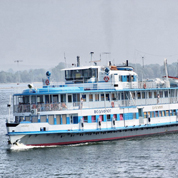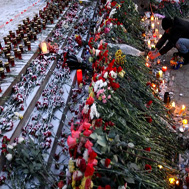Volga ship catastrophe once again highlights Russia’s ‘wild capitalism’ at its worst

This trip, and the resultant catastrophe on July 10, typify Russia’s wild capitalism. Indeed, everything imaginable that could theoretically and practically go wrong with any sea business venture actually went wrong with this ill-fated tour. A greedy ship owner and CEO that has blatant disregard for passengers’ lives, except for their cash; corrupt official industry regulators that are traditionally lazy, professionally incompetent and morally bankrupt to efficiently perform their duties as required by laws, especially if some serious financial incentives are given to make them turn ‘blind eyes’ to overt life-threatening irregularities, such as those that existed in abundance on the doomed ship; a ship captain, so slavishly subservient, that he did not only take ‘criminal orders’ from his CEO that did not only run contrary to common logic, human wisdom and personal survival instinct, but also against all the existing maritime laws designed to safeguard lives on waters that he eventually ended up putting himself, his crew and passengers at unavoidable peril on the Volga.
And, finally, the passengers themselves, to complete the blame list, and for fairness sake, were also fully culpable for this devastating tragedy. Though it is not morally justifiable to blame the dead, especially in such heartrending circumstances, one cannot help but be shocked by the utter recklessness displayed by the passengers on this doomed vessel. Indeed, some of the passengers had so wanted to make the ‘pleasure trip’ that they blatantly disregarded all the unambiguous warnings — both by words of mouth, and for those computer-savvy, on the numerous Internet forums and private blogs from the horrendous personal experiences of the previous travelers on this liner — that some even embarked on this death-trap trip with all their family members. With such a myriad of fatally negative factors — a greedy CEO, a confused ship captain, corrupt official industry regulators, voracious tour operators and carefree passengers attracted by exceptionally low costs of tour packages — simultaneously on display, the tragic end that eventually engulfed this vessel and almost all its inhabitants was a terrible finale destined to happen.
The most heartbreaking thing is that similar situations are the ‘norms rather than notable exceptions’ in Russia, with only the ‘actors’ and ‘scenarios’ changing from industries to industries, but the end results — predetermined tragedies with their unavoidable human losses, painful and distressing post-tragedy traumas for victims’ families, survivors and their rescuers — always predictably the same. For instance, every year, several intercity buses, fatally road-unworthy, evident from the absence of technical viability papers and without the necessary licenses to carry passengers, kill hundreds of citizens because the official regulators hired to ensure such vehicles’ absolute compliance to laid-down regulations or are barred from roads and operations have again and again failed in their official duties. The latest incident happed on July 17, when a passengers bus, for reasons yet unknown, ran into an opposite lane into a fatal head-on collision with a Kamaz heavy-duty truck, killing five and maiming several dozen others.
Again, change the settings and fit in new ‘players, actors and industries,’ another picture with the same ghastly outcome will emerge. A perfect example is the coal  industry, which is known for the highest job-related mortality rate in the country, as a similar criminal scenario of abject official oversight and greedy and uncaring managements, repeatedly forced desperate miners, left with no other meaningful alternatives ways of livelihood, to risk their lives daily in these Soviet-era mines that have long become ‘real death traps,’ which claim a miner’s life for every 2mln tons of coal produced in the country. This negative trend contrasted sharply with those in the Soviet era, where similar data was one miner’s death for every 50mln tons produced.
industry, which is known for the highest job-related mortality rate in the country, as a similar criminal scenario of abject official oversight and greedy and uncaring managements, repeatedly forced desperate miners, left with no other meaningful alternatives ways of livelihood, to risk their lives daily in these Soviet-era mines that have long become ‘real death traps,’ which claim a miner’s life for every 2mln tons of coal produced in the country. This negative trend contrasted sharply with those in the Soviet era, where similar data was one miner’s death for every 50mln tons produced.
Another example is the civil aviation, where investigations into crashed planes have revealed that airlines’ CEOs often prohibit pilots to seek alternative airports or make second landing attempts in cases of life-threatening emergencies in order to economize expensive kerosene. Similarly, there are also reported cases, where worn-out plane parts have been ‘rehabilitated’ as brand new ones to replace defective strategic mechanisms. These and other negative practices have today turned routine flights into ‘heroic feats’ by pilots that are forced daily to risk their lives and those of their passengers, as they dangerously maneuver between their greedy managements’ reckless policies, poor official regulations and the capriciousness of most Soviet-era aircraft that have long exhausted their projected life capabilities during flights.
Ditto for the entertainment industry, where the Lame Horse Club fire catastrophe that claimed almost 160 victims and mutilate several more for life is still vividly fresh in memory. Again, the same pack of lapses and human greed. As shown by investigations, the club owners practically turned their facility into a death trap as they, contrary to fire-safety regulations, converted every single square meter into seats for clients, while the official regulators traditionally turned blind eyes to such policy, as well as the highly combustible materials used to decorate the interiors and the regular open fire entertainment shows that have come to become the club’s hallmark. Expectedly, it was one of such shows that eventually caused the disastrous fire outbreak that destroyed the joint and its over 200 guests on Dec. 5, 2009.
This list of avoidable tragedies is endless, but suffice it to say that the criminal lapses that result in these largely preventable catastrophes are typical occurrences in Russia. Worst of all is the government’s traditional ‘knee-jerk reflex’ reaction to the tragedies that make the official efforts worthlessá as its response in each case usually takes place ‘post-factum.’ Therefore, to curtail these negative trends that are killing Russians in huge numbers, the government needs to start acting proactively, first of all, by strengthening the existing preventive measures and adopting new ones, where none currently exists, rather than waiting for another time-bomb facility to fatally explode in an industry before undertaking the traditional responses such as comprehensive industrial inspections, arrests of corrupt officials, issuance of all threats of all kinds, etc.
Secondly, where preventive measures and legislations are flagrantly, and most importantly, intentionally, violated, the penalties for recklessly risking lives in any business setting should be so high so that they do not only put such business owners and/or CEOs out of operations, but also earn them long prison terms. Or, at the least, the punitive measures should be drastic enough to force them to seriously reconsider their destructive ‘happy-go-lucky mentality’ behaviors, whereby events are totally left to fate to determine, commonly known as ‘avos’ in the country.
Otherwise, these callous business owners and their equally heartless CEOs will continue to regard the government’s traditionally strident post-catastrophe threats as those of ‘a barking toothless bulldog,’ and hence continue to recklessly kill their compatriots in droves. Indeed, the government owes it as a solemn moral and constitutional duty to its law-abiding citizens to ensure that such selfish entrepreneurs are never allowed to return just a few months after yet another nation-shocking tragedy to ‘doing their criminal businesses as usual’ in this country.












 Web design,
Web design,